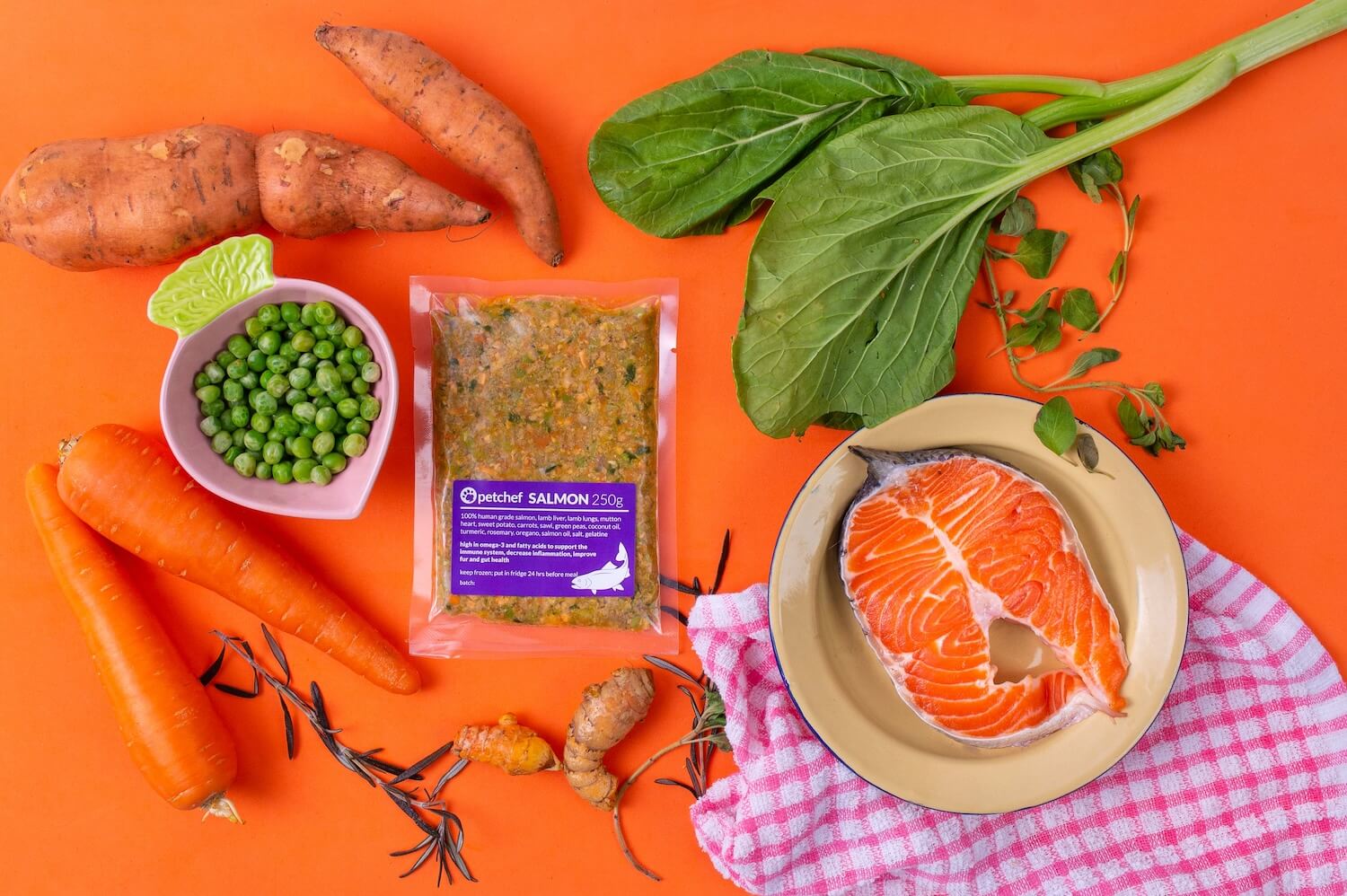Disclaimer: Always check with your vet on what “human foods” your dog can and cannot eat as information may vary based on their dietary needs and health conditions.
Living in a tropical climate, we would do anything and everything to keep ourselves and our doggos cool from the heat. From ice cubes in water to air conditioned rooms and cooling mats, it’s a top priority for parents to ensure that their pups are constantly kept cool and hydrated.
Which then begs the question, is watermelon as beneficial to fight the warm weather for our doggos as for us?
Read on to learn more about whether watermelon is good for dogs, how much should they be eating and more.
Table of Contents
Is watermelon good for dogs?
Yes, watermelon is good for dogs when served correctly and in moderation! Here’s why it can be a healthy snack:
- Hydration: watermelon is about 92% water, making it an excellent way to help keep your dog hydrated, especially in hot weather.
- Vitamins: contains vitamins A, B6, and C, which support overall health, including the immune system, skin, and coat.
- Potassium: helps maintain healthy muscle function and heart health.
- Low-calorie: a low-fat and low-calorie option that’s great for maintaining a healthy weight.
- Digestive benefits: Iits high fiber content supports healthy digestion, though too much can cause an upset stomach.
Watermelon can be a healthy and refreshing treat for dogs, packed with hydration and essential nutrients. Just be sure to prepare it properly and avoid overfeeding.
Is watermelon bad for dogs?
Watermelon is not inherently bad for dogs, but there are some precautions to take when offering it as a treat. Here’s a breakdown:
Seeds
Though tiny and chewable for us, watermelon seeds can cause intestinal blockages, especially in smaller dogs.
Rind/skin
The tough outer skin is difficult to digest and may lead to gastrointestinal upset or choking.
Sugar content
While the sugar in watermelon is natural, feeding too much to a dog (especially one with diabetes or prone to weight gain) can be harmful.
Allergies or sensitivities
Some dogs may have sensitivities to certain fruits, including watermelon. When introducing fruit, do so gradually and watch for any signs of digestive issues, like vomiting or diarrhea.
Health conditions
Watermelon contains natural sugars, so it should be given sparingly to dogs with diabetes or weight issues.
Which is why at Petchef, we ensure that all the ingredients that go into our dog food recipes are made of fresh, clean ingredients only! All the meals tailored for dogs contain:
50%+ meat (chicken, buffalo, beef, salmon, tuna, duck, etc)
45%+ vegetables and broth for additional nutrients
3.5% herbs and oils
It’s completely free of preservatives, additives, fillers and grains! If you’d love for your dog to eat the food they were born to eat, come have a chat with our friendly pet nutritionist to find the ideal meal for your pet
Watermelon is not bad for dogs when prepared properly and served in appropriate amounts. However, it can be harmful if fed in excess, or if seeds and rind are included. Always monitor your dog after introducing new foods to ensure they tolerate it well.
How much watermelon can a dog eat?
The amount of watermelon a dog can eat depends on their size, age, and health condition. Generally, it’s best to offer fruit as an occasional treat rather than a regular part of their diet. Here are some general guidelines:
- Small dogs (under 9 kgs): 1–2 small bite-sized pieces (about 1–2 tablespoons).
- Medium-sized dogs (9 – 23 kgs): 2–4 small bite-sized pieces (about 3–5 tablespoons).
- Large dogs (23+ kgs): 4–6 small bite-sized pieces (up to 1/2 cup).
Keep in mind that watermelon should only be given in moderation. Too much can cause an upset stomach or diarrhea due to the high water and fibre content.
How to tell when a dog has had too much watermelon?
If your dog has had too much watermelon, they may show signs of digestive upset or discomfort. Some common symptoms to watch for include:
- Diarrhoea or loose stools: excess watermelon can overwhelm their digestive system due to its high water and fiber content.
- Vomiting: If your dog eats too much watermelon, they might vomit as a way to get rid of the excess.
- Stomach discomfort: too much watermelon can cause gas buildup, leading to discomfort or bloating, especially in smaller dogs.
- Lethargy: overeating watermelon, especially because of its sugar content can lead to a drop in energy levels, making your dog seem more tired than usual.
- Frequent urination: Watermelon’s high water content can make your dog urinate more frequently than usual.
If you notice any of these symptoms after feeding your dog watermelon, it’s a good idea to withhold food for a while to let their digestive system settle. Always ensure they have access to fresh water. If symptoms persist or worsen, it’s best to consult your vet for advice.
How often can dogs eat watermelon?
Dogs can enjoy watermelon as an occasional treat, but it should not be a daily food item. For most dogs, offering watermelon once or twice a week is a safe and healthy frequency.
Since watermelon is a sweet fruit with a decent amount of sugar, water and fiber, it’s best to treat it as an occasional snack rather than a regular part of their diet. Watermelon should only make up a small portion of your dog’s daily intake—no more than 10% of their total daily calories.
As with any new food, monitor your dog for any signs of digestive upset after giving them fruit. If they seem to tolerate it well, you can continue offering it occasionally, but always in small, manageable amounts.
Rare treat only
Offer watermelon as an occasional treat, perhaps once a month or even less frequently. Keep the portion size small (a teaspoon for small dogs, a tablespoon for larger dogs).
Monitor for symptoms
If you give your dog watermelon, always observe them for any signs of digestive discomfort (vomiting, diarrhoea, bloating, lethargy).
How to feed your dog watermelon?
Feeding your dog watermelon is simple, but there are some key steps to ensure it’s done safely:
- Choose a fresh, ripe watermelon: make sure the watermelon is ripe and free from mold or spoilage. Wash it thoroughly to remove any dirt or chemicals on the skin.
- Remove the rind: the rind is tough and difficult to digest for dogs, so you should cut away the green skin. Never feed your dog the rind, as it can cause gastrointestinal issues.
- Remove the seeds: watermelon seeds can pose a choking hazard or cause intestinal blockage, so carefully remove all seeds from the flesh before feeding it to your dog.
- Cut into small pieces: cut the watermelon flesh into small, bite-sized chunks that are easy for your dog to chew. The size should depend on your dog’s breed and size; smaller dogs should have smaller pieces.
- Serve as an occasional treat: watermelon should be given as a treat and not as a regular part of your dog’s diet. Keep it to a few pieces once or twice a week. Serve the watermelon fresh, either chilled, at room temperature or frozen as a cool, refreshing treat for your dog.
- Observe for allergic reactions: as with any new food, it’s a good idea to start with a small amount of watermelon and watch for any signs of digestive issues, like vomiting or diarrhea. If your dog shows any negative reactions, discontinue the watermelon and consult your vet.
By following these steps, you can safely treat your dog to some delicious watermelon!











